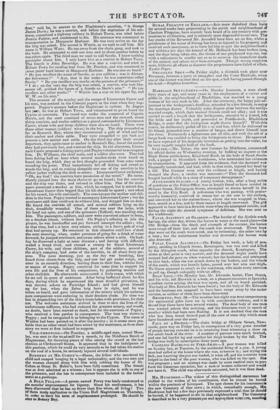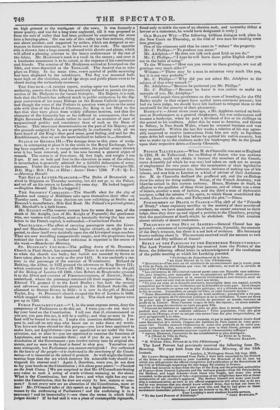Ma. Husxissow.—The widow of this distinguished statesman tuft yielded to
the wishes of his constituents, that he should be buried within the precincts of Liverpool. The spot chosen for his intermentis the new Cemetery of that town ; in which, remarkably enough, Mr. Huskisson had but a few days previously expressed a wish that he should be buried, if he happened to die in that neighbourhood. The Cemetery is described to be a very picturespe and approgiate structure, standing on high ground to the northeast of the town. It was formerly a stone quarry, and was for a long time neglected, till it was proposed to form the sort of valley that had been produced by excavating the stone into a burying-place. On one side of this valley are four terraces rising one above another, and supported by arches, which are designed as en- trances to future catacombs, to be hewn out of the rock. The opposite side is thrown into a huge mound, adorned with shrubs and plants, which will afford a pleasing contrast to the heavy architecture of the rest of the fabric. Mr. Hnskisson's tomb is a vault in the centre ; and over it a handsome monument is to be raised, at the expense of his constituents and friends. The remains of Mr. Huslsisson arrived at Liverpool on the 18th, and were deposited at the Town-ball. The funeral was to take place on Fiday. In the mean time, every symbol of public mourning had been displayed by the inhabitants. The flag was mounted half- mast high on the churches and all tip shops and public places were to be dosed during the melancholy ceremony.
THE CIIURCIL—A current report, resting upon-we know not what authority, asserts that the King has positively refused to permit the pro- motion of Dr. Philpotts to the vacant bishopric. His Majesty, it is said, feels that the Church has suffered much in public estimation by the flip- pant conversion of too many Bishops on the Roman Catholic question ; and though the votes of the Prelates in question were given on the same side with that of the Duke of Clarence, the King is not blind to the fact that they were given from widely different motives, and that the character of the hierarchy has so far suffered in consequence that the Right Reverend Bench stands rather in need of an accession of men of unquestioned probity and consistency than of such as the Dean of Chester. This important determination on the part of his Majesty, and the grounds assigned for it, are so perfectly in conformity with all we have heard of the King's clear good sense, good feeling, and zeal for the Establishment, that we are the more inclined to believe it.—Standard.
STATUE OF GEORGE III.—The damage done to this piece of sculp- ture, in attempting to place it in the niche in the Royal Exchange hav- ing been repaired, so as to escape observation, the partial screen Exchange, over it has been removed, and it has now become a general object of
remark. The statue is of free-stone feet high, and weighs 1 ton 3 qrs. If not so bold and free in die execution as some of the others, it nevertheless is generally admired for a faithful delineation of coun- tenance. Under the statue is the following inscription : " Georgius HI. D.G. Mag : Brit : Fra : et Ribes : Anne : Dom : 1760. P:S: Q: L: --Morning herald.
THE ROYAL LETTER-SEARCHER.—The Duke of Brunswick ar- rived in Brighton on Thursday morning, but did not go to the Palace, and set off on his return to London, the same day. Ile looked haggard. .—Briyhton Herald. [He is ahaggard.] THE SHERIFFS' CARRIAGES.—The Sheriffs elect for the city of London and county of Middlesex take upon themselves their office on " Tuesday next. Their dress chariots are now exhibiting at Stubbs and Bancock's manufactory, Mile End Road. Mr. Poland's is painted green; Mr. Marshall's is a Hark brown.
Mr. Kietcnr.--s.The rumour current here for some days past, of the death of Mr. Knight, (son of Mr. Knight of Papcastle) the gentleman who, our readers will recollect, acted so heroically during the late revo- lution in the French capital, is unfounded.—Cumberland Packet.
TRAVELLING.—The effect of carrying passengers upon the Liver- pool and Manchester railway coaches begins already, as might be ex- pected, to show itself very decidedly upon the old Liverpool stage-coaches. They are now travelling comparatively empty, and the proprietors have reduced the fares 2s. A further reduction is expected in the course of the week.—Manchester Mercury. ST. DUNSTAN'S Criencu.—The pulling down of St. Dunstan's Church in Fleet Street, has commenced. There is no direct evidence as to when the church was built ; but burials are recorded by Stowe to have taken place in it as early as the year 1421. It was anciently a rec- tory in the patronage of the convent of Westminster. Richard de Barking, the Abbot, in 1237 granted the advowson to King Henry III; which continued in the Crown till 1362 ; it was afterwards in the gift of the Bishop of London till 1386, when Robert de Bragbrooke granted It to the Abbot and convent of Prernonastratenses, of Alnwick, North- umberland, where the patronage remained till their suppression. King Edward VI. granted it to the Lord Dudley ; but both the rectory and advowson were afterwards granted to Sir Richard Sackville, till alienated to George Rivers in 1625: it is now in the gift of Richard Taylor, Esq. St. Dunstan's church escaped the fire of London in 1666, which stopped within a few houses of it. The clock and ligtu-es were put up in 1761.
• FUDGE PARLIAMENTARY.--" I, in the most express terms, deny the .competency of Parliament to do this act. I warn you—do not dare to lay your hand on the Constitution. I tell you that if, circumstanced as you are, you pass this act, it will be a nullity, and that no man in Ire- land will be bound to obey it. I make this assertion deliberately. I re- peat it, and call on any man who hears me to take down my words. You have not been elected for this purpose—you have been appointed to make laws, not Legislatures—you are appointed to act under the Con- stitution, not to alter it—you are appointed to exercise the functions of Legislators, and not to transfer them ; and if you do so, your act is a dissolution of the Government—you resolve society into its original ele- ments, and no man in the land is bound to obey you. Yourselves you may extinguish, but Parliament you cannot extinguish ! It is enthroned in the hearts of the people—it is enshrined in the sanctuary of the Consti- tution—it is immortal as the island it protects. As-well might the frantic maniac hope that the act which destroys his miserable body should ex- tinguish his eternal soul ! Again I, therefore, warn you, do not dare to lay your hands on the Constitution ; it is above your power."—Plunkett on the Irish Union. [We are surprised to find Mr. O'Connell attributing any value to such a string of words without meaning as the above. What is the Constitution, but the laws ; and what right has any one Under the Constitution, that he does not enjoy by law, statute or corn- Mon ? Is not every new act an alteration of the Constitution, more or less ? Mr. O'Connell talks of this speech as a legal decision. What is meant by the enthroning of Parliament ? and the enshrining it in a sanctuary? and its immortality ?—are these the terms in which Irish judges decide? If he had said it was a piece of contemptible rigmarole, fitted only to tickle the ears of election mob, and unworthy either a lawyer or a statesman, he would have designated it truly.] OLD BAILEY WIT.—The following brilliant dialogue took place in the New Court on Thursday, at the trial of two men for stealing some iron gratings.
One of the witnesses said that he came to " reduce " the property. Mr. C. Phillips—" To produce you mean." Mr. Adolphus—" He does not talk such good Irish as you do." Me. C. Pe I hope he will learn more polite English than you are in the habit of using."
To the Witness—" How can you swear to these gratings, are not all gratings very much alike ?"
Witness-- There may be a man in existence very much like you, but it is not very probable."
Mr. C. Phillips—" Why did you not select Mr. Adolphus as the subject of that witty remark ?"
Mr. Adolphus--" Because he preferred you Mr. Phillips."
Mr. C. Phillips—" Because he knew it was ;useless to make an example of you, Mr. Adolphus."
We could acquit these gentlemen on the score of breeding, for the Old Bailey might in that respect have spoiled more courteous persons; but had we been judge, we should have felt inclined to relegate them to the tread-mill for the atrocity of their pleasantry.
HONESTY.—About seven years ago a Mr. Appleton carried on bud.. ness at Northampton as a general shopkeeper, but was unfortunate and became a bankrupt, when he paid a dividend of five or six shillings in the pound to his creditors. After this he went to America, and thence to Sidney, in New South Wales, where he resumed business and was very successful. Within the last few weeks a relation of his was agree- ably surprised to receive instructions from him not only to liquidate some debts left unpaid by him before he quitted his native country, but also to make up to the creditors under his bankruptcy 20s. in the pound upon their respective debts.— county Chronicle.



























 Previous page
Previous page